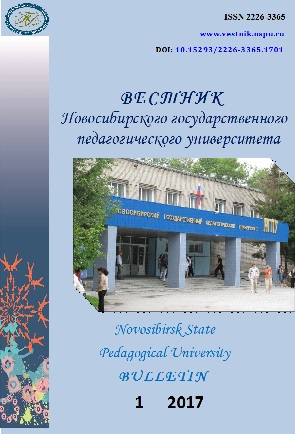Кадровый потенциал как основной фактор успешной реализации инклюзивной системы образования
Нuman resource as a key factor for successful implementation of the inclusive education system
Author(s): Larissa Arnoldovna Shkutina, Ainagul Rymkhanova, Natalia Viktorovna Mirza, Gulbanu Ashimkhanova, Gulnaziya AlshynbekovaSubject(s): Inclusive Education / Inclusion, Sociology of Education
Published by: Новосибирский государственный педагогический университет
Keywords: inclusive education; teacher training; professional competence; pedagogical specialty university; curriculum; model curriculum; teaching staff;
Summary/Abstract: Introduction. The article provides an overview of the scientific literature and analyzes of approaches to the problem of teachers professional training in conditions of inclusive education. The purpose of this article is to assess the results of the study of the current state of train-ing of teachers in higher education institutions of Karaganda, Kazakhstan, through comparative content analysis of curriculum in modular educational programmes and determination of their compliance with the standard curriculum for undergraduates of educational direction. The authors, citing legal documents, justify the relevance of the implementation of the educational module "Inclusive Education", which in addition to basic knowledge, skills and abilities of the future teacher in a comprehensive school provides special professional competencies needed to work in the conditions of inclusive education.Materials and Methods. The research methodology includes theoretical methods: a review of the scientific literature on teacher training abroad, in the CIS and in Kazakhstan; analysis of awareness of the problem in its various aspects; empirical method: mathematical processing of statistical reliable data.Results. As a result of the study of the curriculum`s content and compliance with the model curriculum of undergraduate specialties of educational direction in the universities of Karaganda, it was found that the content of the curriculum of the overwhelming majority of specialties, unfortunately, does not fully comply with the model curriculum, which means that students, future teachers, still aren`t taught specifics of inclusion.Conclusions. In conclusion authors underline the necessity of reviewing the content of the universities` teacher training programs due to the need of graduates with a high level of development of new professional skills to suit modern educational space.
Journal: Вестник Новосибирского государственного педагогического университета
- Issue Year: 7/2017
- Issue No: 1
- Page Range: 21-33
- Page Count: 13
- Language: Russian

